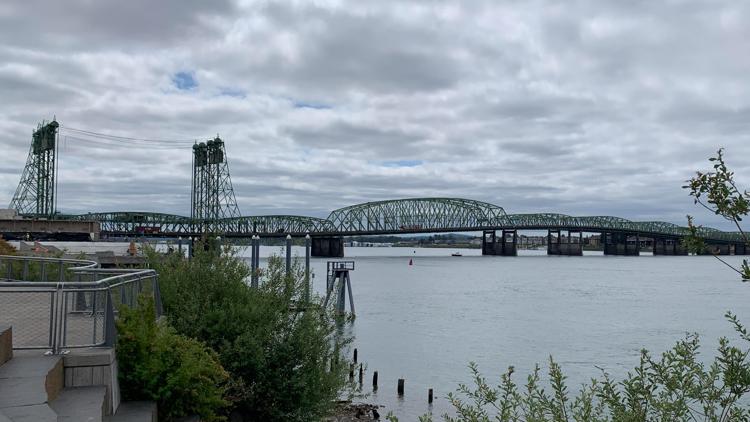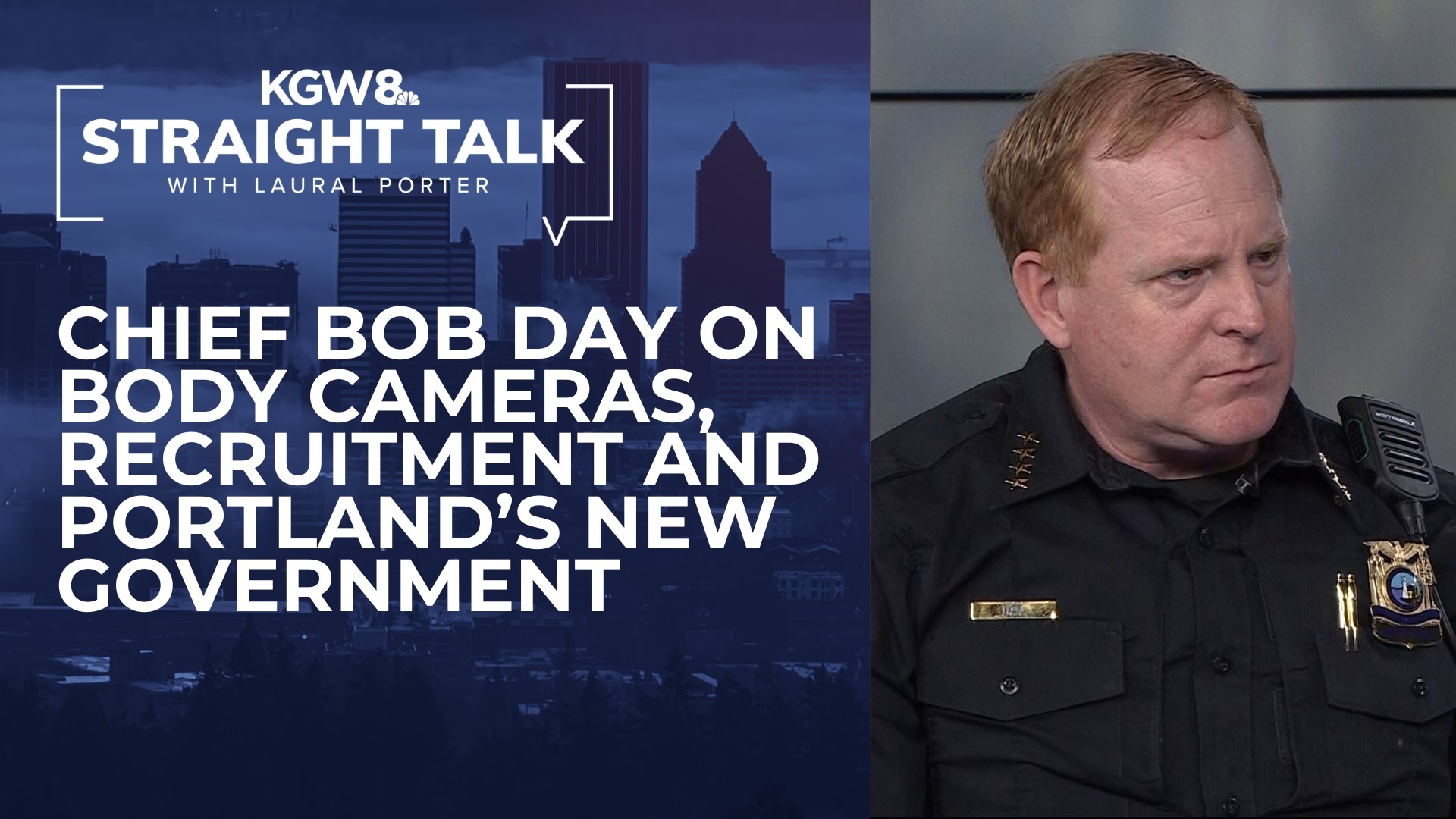PORTLAND, Ore. — When Greg Johnson was a young boy growing up in Michigan, his family was displaced when a freeway project cut right through their neighborhood. The family ended up moving several times in a year and a half before they finally settled down in the place Johnson would grow up. He said his father never stopped talking about his frustration over what happened, and the fact his voice wasn't heard and his opinions never taken into account.
"I have spent my career making sure folks who are impacted by projects like this have their voices heard, and make sure they are part of the process," Johnson said.
Johnson became a highway engineer and served as the Deputy Director for the Michigan Department of Transportation. Now, he's heading up the Interstate Bridge Replacement (IBR) program. It's a joint effort between the Washington and Oregon Departments of Transportation to replace the I-5 bridge over the Columbia River connecting Portland and Vancouver.
Replacing the bridge has been discussed for decades and after the plan called the "Columbia River Crossing" was scrapped in 2013, traffic congestion on the bridge has only gotten worse. Johnson said it's time to get a replacement project across the finish line and do it with a focus on equity.
"We have a challenge in front of us and it's a challenge that we cannot pass on to another generation of folks. We have got to get this done and we've got to get in done right," he said.
Not everyone agrees with the Interstate Bridge Replacement plan.
Joe Cortright, a Portland economist, is critical of the bridge — right down to the name of the project.
"They call it the 'bridge replacement project,' but it's considerably bigger than that. It's really a five mile long freeway, 12 lanes wide, and it's going to cost $5 billion, and it's going to require round trip tolls, according to ODOT's own estimates, of $5," he said.
Greg Johnson and Joe Cortright were guests on this week's episode of Straight Talk to discuss the latest bridge project.
Story continues below.
Interstate Bridge history
Tens of thousands of trucks and passenger vehicles cross the Interstate Bridge on I-5 between Portland and Vancouver, Wash. every day.
Anyone who has driven the bridge on a regular basis knows why it's been identified as one of the region's top bottlenecks. The bridge sees 7 to 10 hours of congestion during morning and evening commutes.
The bridge contains two spans. The northbound span is 104 years old and opened in 1917. The second span, which now carries southbound traffic, was built 40 years later and opened to traffic in 1960.
The bridge has been deemed "functionally obsolete," which means it doesn't meet current freeway standards. In spite of all that, there's been little agreement between the two states on what to do about it.
Not another Columbia River Crossing
Washington and Oregon undertook a joint freeway mega-project called the Columbia River Crossing from 2005 to 2013. But after spending an estimated $300 million studying the project, it was ultimately scrapped when Washington lawmakers refused to approve it.
In 2020, the Washington and Oregon State Departments of Transportation started discussions again on a new project called the "I-5 Interstate Bridge Replacement Project." ODOT and WSDOT named Greg Johnson as the program administrator for the program. Johnson said this time around, the governors of both states have come together, as well as both legislatures.
"We have a bi-state legislative body that oversees our work, oversees the things we are doing. We meet with them on a regular basis to keep them up to speed, so there will be no surprises," Johnson said.
Johnson called the bridge "tremendously important" to the economy of the region.
"The bridge carries $70 million worth of goods every day. It is an important regional and national asset. The jobs that are there, as well as other surrounding jobs in the community, getting folks back and forth to those jobs. We need to make sure that the future economic wellbeing of this region is taken into account," Johnson said.
More than a bridge replacement
In his criticism, Joe Cortright called the new I-5 bridge replacement project a massive, expensive freeway project with a misleading rebrand.
Cortright said it's not just about the bridge, but also adding multiple lanes of freeway. Cortright said there are three "fives" that define the project: it's five miles long, it will cost $5 billion, and cost a $5 round trip toll.
Johnson countered that argument and said you can't just drop a bridge in the middle of a corridor when there are other issues.
"The interchanges in this stretch are too closely spaced. We have to deal with that issue, because that is one of the drivers of congestion and safety issues in this corridor," Johnson said.
Tolls
Johnson said no tolling decision has been made yet, but did say projects like this one have traditionally been paid by tolls.
"These types of projects are too big to absorb by individual departments of transportation," he said.
He said the issue of equity will be a part of any decision taking into account low-income individuals who need to cross the bridge to get to work.
"We are looking at a number of different best practices around the world that can address the equity that comes along with tolling," he said.
Shifting the gridlock
Cortright said tolling would reduce traffic on the I-5 bridge and dramatically increase gridlock on I-205 and the Glenn Jackson bridge.
"If you are driving, you are going to choose the route that is going to cost you the least. The point is we will have spent several billion dollars on a massive freeway there that fewer people will be using than are using today," Cortright said.
Johnson pointed out that Oregon is considering congestion pricing on both the I-205 and I-5 corridors, and Cortright's analysis doesn't take that into account.
"The issue here is we have a 104-year-old bridge that is in danger of failing in an earthquake event, and Joe is advocating, basically, do nothing and it will take care of itself. That's just not so," Johnson said.
Cortright's idea is to implement congestion pricing first before any bridge replacement plan, then decide if more capacity is needed and fix the bridge then. He said traffic would flow much better on both the I-5 and I-205 bridges with congestion pricing.
"It doesn't make a lot of sense to spend $5 billion on a whole bunch of capacity if we are going to toll it which is going to dramatically reduce the number of people crossing the bridges," Cortright said.
Light rail
A major sticking point in the Columbia River Crossing project was including light rail. Oregon leaders pushed for it, but Clark County residents were opposed.
Johnson said the new project is committed to looking at high capacity transit, whether it's bus rapid transit, light rail, or a combination. He said giving people an alternative to single occupancy trips is key to reducing traffic.
"If we can get folks into a high capacity transit mode rather than a single occupancy trip, that in itself will help resolve some of the safety congestion issues that we see every day on the bridge," Johnson said.
Climate change
Cortright said replacing the bridge and building more road capacity is the wrong thing to do if the region is serious about addressing climate change.
"We know building more road capacity, more demand, more travel means more greenhouse gas pollution. If we are serious about doing something about climate change and avoiding the utter disasters we have seen with forest fires and other dislocations, we have to take a different course than we have been taking for 50 years by building more and more freeways," Cortright said.
Johnson said doing nothing will exacerbate the problem. He said the cars are already there and the demand is there to cross the river and that isn't going away. He said the Interstate Bridge Replacement program has hired a principal climate officer who is overseeing everything they do with an eye on reducing carbon emissions.
As reported in The Columbian, members of the project's Executive Steering Committee have emphasized the need to not only limit but reduce carbon emissions.
"Minimizing (emissions) isn't good enough. Severely reducing is how this project is going to have to think about it," said Metro Council President Lynn Peterson.
Johnson said he thinks that's possible by making smart choices.
"(By) looking at the technology that is coming in vehicles, the electrification of fleets is one of the key things that will move the needle on greenhouse gas production," he said.
Bottom line
Cortright said ODOT has been talking about this project for a long time, and kicking the can down the road on basic questions of how much it would cost and who would pay.
"So as citizens, and as the Straight Talk program suggests, we should be getting straight answers to these very basic questions about this project," Cortright said.
Johnson said those are the questions the IBR program is working on. They are taking feedback from the community and have already received 15,000 comments.
Citizens can find out more about the project and add their own comments by visiting the project's website.
You can read more about Joe Cortright's concerns about the IBR program here.
Straight Talk airs Friday at 7 p.m., Saturday at 6:30 p.m. and Sunday at 9:30 p.m.
Straight Talk is also available as a podcast.



